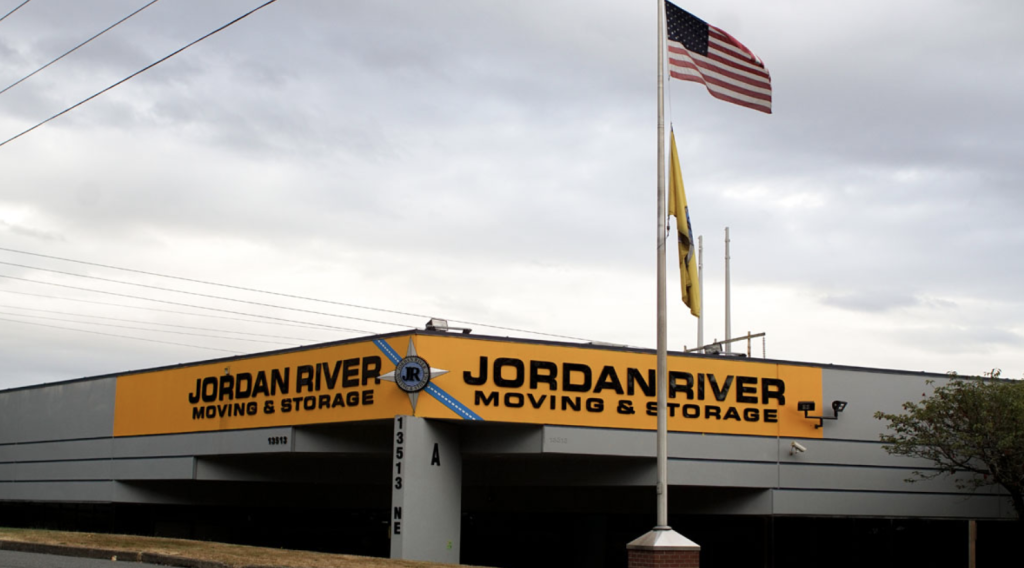
Complete Guide to Moving Scams: Become an Expert, Not a Victim
It can be easy to fall for a scam when you’re in unfamiliar territory. Most people don’t have much experience with the moving industry because moving isn’t something we always do. As customers, we’re not sure what the price should be, what the process is, the vocabulary, the different types of estimates, and the list goes on! I’m here to help educate you so you don’t fall victim to a moving scam.
Scam #1: The “Binding Estimate” Email
In this blog post, you’ll learn about five extremely common moving scams. I’ll call the first one the “Binding Estimate via Email” scam. People always fall for it because it’s designed to confuse you and take advantage of your lack of understanding of the moving industry. This is a classic bait-and-switch scam. Luckily, you won’t be a victim after reading this article! Read on to learn about this scam and others, how they work, how to avoid them, and how Jordan River Moving can help.
The Scam Setup
Here’s how it starts. You want to move, so you decide to contact a moving company to determine the process. You want to know how much it will cost, when they are available, and other important information. A salesperson answers the phone and asks you for a list of items you need to be moved. You give your best guess based on the number of rooms you have, how many beds, how many couches, some clothes, and dishes. They know you have no idea how much stuff you actually have. But they seem to know what they’re talking about, so no red flags go up. The salesperson uses this information to roughly estimate the number of total boxes you will need to have moved. They will offer you a quote over the phone without seeing your home or items. This “quote or estimate” IS NEVER ACCURATE. The scam moving company will give you a really low estimate and tell you it’s binding, which means you will not pay anything above or below that price. It’s promised to you. They even send you an email telling you it’s binding. And now you’re hooked because there is no such thing as a binding estimate email.
Think about it. It is only possible for a moving company to know exactly how much stuff you need moved by seeing it for themselves, and the only way to do that is by offering you a free in-home visual estimate. If they don’t offer to provide one, you could be dealing with a scammer! A Relocation Specialist at a good moving company will tell you that anything over the phone is just a ballpark estimate. Even an in-home visual estimate is still an… estimate. It takes years of experience, even for trained visual estimators, to learn the skill. Good moving companies tell you the closest estimate you can get is from an in-home visual estimate.

The Reveal
Now, it’s the day of your move. You’re prepared to pay the price listed in your scam “binding estimate” email. The moving company you hired shows up, and gasp! You have way more stuff than they thought (even though they knew this would happen). They might ask you to sign a new estimate form to cover all the “extra” stuff you need moved. There will be a HUGE increase in charges. They might even try to have you sign a blank estimate form. Don’t ever sign a blank form! So now you’re backed into a corner.
Your choices:
- Cancel the move even though you’re packed and ready to go
- Try to find another moving company to come right now and do your move
- Pay whatever they say and get your move completed
Most people choose the third option because they feel like it’s their only choice at that point. Keep reading to see how new regulations and giving yourself a 1-2 day cushion can help you fight this scam.

The Loophole
You’re probably wondering how these scammer moving companies can do this. Why aren’t they getting in trouble or put out of business? Six magic words in their paperwork provide the loophole… “based off the information you provided”. Remember that phone call when you tried listing all the items in your home? Well, now, it’s your fault the “binding estimate” was too low, and the company can legally charge you for the extra items. Want to know the worst part? These companies are backed by a transportation attorney who designs their paperwork. It’s designed to trick, scam, and take advantage of you. It’s also designed to protect the scam company. Don’t worry, we’ll teach you how to fight back!
The Aftermath
So, here you are. You probably feel sad, cheated, and stressed and didn’t budget for this. You might think you have no case for legal action because of the loophole in the paperwork. Chances are, you’ll have a hard time recovering your scammed money and ever trusting movers again. We’re here to help you so you never fall for this scam or any other one in the first place.
How to Avoid This Scam
How could this have been prevented? Yes! Here are my tips:
- Get an in-home visual estimate to know how much stuff you need moved.
- Call multiple moving companies for quotes and compare them based on your in-home visual estimated weight.
- If a moving company’s quote is really low, it could be a scam.
- Even if a company sends you a “binding estimate via email,” now you know there’s no such thing. A company cannot give you an accurate binding estimate without seeing your stuff in person.
- Hang up the phone on a company that wants to charge you by cubic feet.
- Hang up the phone on a company that charges you for a binding estimate.
- Never pay more than a 10% deposit.
- Jordan River Moving is able to help many people who have fallen for the “binding estimate” via email scam. The good news is these customers are doing research before the move, so Jordan River is able to educate them by telling them there is no “binding estimate” via email unless the company visually sees your house and items. Customers are saved from the moving day heartache before the scammers can charge the increased fees.
- Make sure you hire a company that offers a free in-home visual estimate. If they don’t offer one, don’t hire them!
- Make sure you hire a company that helps you understand that any estimate over the phone is a best-guess estimate. This is true for even the most reputable moving companies.
Become an Expert, Not a Victim
Now that you know all about the “binding estimate via email” scam, from the setup to the reveal, the loophole, the aftermath, and the preventative measures, you won’t fall for it.
Do your research, get an in-home estimate and multiple quotes from reliable moving companies, and avoid being scammed. Read on to learn about other common moving scams and how to avoid them.

Scam #2: The Cubic Feet Scam
The Scam Setup
This scam takes advantage of our lack of knowledge of the shipping world. Shipping should always be based on the amount of weight for the items. In this case, how much your household items weigh should dictate the cost of moving them. The industry standard is weighing a shipment using a certified scale. The military, government, and all reputable moving companies use this method. Scam moving companies use cubic feet as a loophole to lowball the price by quoting you a “price per cubic foot” for your move. Only scam companies will offer you an estimate based on volume (cubic feet) rather than weight.
The Reveal
Here’s how it works. The scam company gives you a quote for 500 cubic feet for your items, meaning they will take up 500 cubic feet of space on the moving truck. On moving day, the scam movers can create holes of empty space by packing the truck to make it look like your stuff takes up more room. These scammers can make 500 cubic feet of boxes look like 1,000 cubic feet. After your items are loaded into the truck, the scam company will tell you that instead of 500 cubic feet, you have 1,000 cubic feet, and now it will cost double the amount you were quoted.
The Loophole
Cubic feet are not a precise measure for moving household items. Scam companies try to convince you that other moving companies who charge by weight will add weight to your shipment and charge you more money. This is absolutely not true. If you want to, you have the right to supervise the weighing of the truck. You can see it empty, then watch the movers load it to see that the weight is fair.
The Aftermath
Your choices are slim once your items are loaded onto the truck. The scammers know this and will use it to exploit you and charge huge fees.
How to Avoid This Scam
This is an easy scam to avoid as long as you know never to hire a company that quotes you based on volume instead of weight.

Scam #3: The Hostage-Load
The Scam Setup
The hostage scam is heartbreaking. This scam is centered around loading your stuff on the truck first, then the problems begin. The hostage-load scam starts much like the other scams, sometimes with a lowball estimate or any other trick to get you hooked. This scam can be hard to spot unless you know the general signs of a shady moving company. Don’t worry. Keep reading, and you’ll learn all about red flags and how to spot them.
The Reveal
Once your goods are on the truck, scam moving companies have a few tactics. They might tell you right after loading that you owe more money for additional “fees” or unforeseen services. They might demand the extra money right away. Sometimes, they wait until they drive away with all your stuff and then start demanding extra money before delivery, holding your items hostage until you agree to pay.
The Loophole
As with other similar scams, you are at a disadvantage once your items are loaded into the truck. Don’t let the truck leave if you feel something sketchy is happening. You can have the movers unpack everything if you want to.
The Aftermath
The best-case scenario is they deliver your things as agreed, and you’re just out a whole bunch of money. In other variations of this scam, your items could be gone forever.
How to Avoid This Scam
Make sure you understand all fees and charges before you sign the contract. A reputable moving company will ensure you understand the potential for additional costs before signing the contract. Sometimes there will be additional charges for extra flights of stairs, shuttle vehicles upon delivery, or packing materials. A good moving company will ensure you understand this and list the prices in writing when you sign your contract. Never sign a blank form. All of the information should be listed before you sign anything. If you have a new estimate on moving day make sure you’re not signing a blank estimate form.

Scam #4: The Abandon
The Scam Setup
Scam moving companies who run this scam are usually “new” moving companies. They don’t have an established reputation but promise low prices to get you hooked. They can set up shop for a few months and close down before getting caught. Then, they pop up again with a new name but the same old tricks. Here’s how the scam works. The scam moving company collects your money, usually as a large deposit or full payment, before your move. On the day of the move, they load up your stuff, and you never see them again.
The Reveal
You might not find out right away that you’ve been scammed. You might find that it’s suddenly hard to contact the company. Your emails and phone calls go unanswered. Their phone may be out of service, and their offices may be empty. After a while, you realize they’re nowhere to be found, and you have no idea where your stuff is. Sometimes, they leave it packed in the moving truck and abandon it. If you’re “lucky,” they may put it into a storage facility, but they usually won’t tell you that.
The Loophole
It’s relatively easy to set up a moving company. If customers don’t research, these companies can scam hundreds of customers, then go out of business before any consequences.
The Aftermath
This scam is so hard because sometimes your items are just gone. If you get lucky enough to find them, there are often considerable fees to get them out of storage, especially if they have been sitting there for a long time before you find them. Even worse, if your things sit in storage for long enough without payment, the storage company can legally auction them off to make room for paying tenants, and the storage company is none the wiser.
How to Avoid This Scam
There are lots of ways to avoid this scam. Do your research on reputable moving companies. Only hire companies operating for years and with a good reputation. Don’t pay a large deposit or full payment before your items are delivered. Never pay more than a 10% deposit and make sure your deposit is refundable. Don’t pay in cash! If you have an Apple AirTag, put it in one of your boxes to track the shipment, just in case. And trust your gut. If the moving company seems sketchy, they probably are!

Scam #5: The Large Cash Deposit
The Scam Setup
This moving scam is a favorite among scam companies. Here’s how it works. You call the company or contact them online. They give you a quote for your move but require a cash deposit before delivery. Some companies even trick you into agreeing by offering you a special discount by paying this cash deposit. Sometimes, they even ask for the full payment for your move in cash before delivery. At this point, please tell me you’re not falling for this one!
The Reveal
This moving scam can go in many directions from here. After the cash is collected, the company might hold your items hostage, abandon them, refuse delivery, or disappear altogether.
The Loophole
Cash is untraceable. The only ones who know you paid are you and the scammer moving company. It’s tough to prove a transaction took place when it’s done in cash.
The Aftermath
Depending on the scam’s direction, you may lose some cash. You may lose all of your items or both!
How to Avoid This Scam
Any reputable moving company will ask for payment upon delivery. They will not require you to pay in cash or ask for a large deposit. If a moving company only accepts cash, beware! If they ask to be paid in full before your move happens, that’s a big red flag too. Never pay more than a 10% deposit and make sure it’s refundable! Avoid this scam by using a credit card. There will be a transaction record, and if you get scammed, the credit card company can help you fight the scammers.

Avoiding Moving Scams: How to Become an Expert, Not a Victim
According to the Federal Motor Carrier Safety Administration, on average, people lose more than $16,000 per claim to moving fraud and scams. Fight back against scammers with these additional tips from the pros, or better yet, don’t become a victim in the first place.
Be Aware of New Regulations
Times are changing, and there are new Federal regulations for moving companies to help you fight scammers. Here are the most recent changes you might not know about:
- Moving companies must return your deposit if you request it (as long as you ask before the move). They cannot refuse and keep your money.
- Moving companies must send you a written estimate to sign three days before your move. Read the written estimate carefully, and don’t sign it if you don’t understand it or if the language is blank or vague. Never sign a blank form!
- If there are any changes on the day of the move, the moving company must provide a completely new estimate, not a revised one or a change order. If the price goes up significantly- don’t sign it.
If you DO get scammed, contact the Federal Motor Carrier Safety Administration (FMCSA). As part of the US Department of Transportation, they can help you file a complaint, access state-specific resources, and learn more about moving fraud.
Build In Cushion Time for Your Move
- Don’t make flight arrangements or any travel arrangements for the day of your move. This locks you into a deadline, and scammers know it. Give yourself 1-2 days of cushion time by planning to stay in a local hotel to ensure the move goes smoothly and to take care of any last-minute details.
- A moving scam can cost you between $10,000- $20,000. Keep your money away from the scam artists. A few nights in a hotel will allow you to fight back if a company is trying to scam you. The extra cost of the hotel is worth it in the big picture.
Scam companies don’t care about moving your stuff safely. Giving yourself extra days after the move date will allow you to hire another moving company without the pressure of missed flights or dates set in stone. You won’t be as rushed and can hire a reputable moving company.
Use Free Online Research Tools
Interstate movers must be registered with the Federal government and have a U.S. DOT number. You can use the FMCSA search tool to search their database to confirm your mover is registered and view other information about the company.
Understand Your Moving Estimate
Understanding the different types of moving estimates is essential to avoid a moving scam. Educate yourself to choose what’s best for you and be better at spotting a scam. The three most common types of estimates are:
- Binding Estimates
- Non-Binding, Not to Exceed Estimates
- Non-binding Estimates
Other Tips and Red Flags
- Don’t pay cash for your move balance. Cash is impossible to track, making it easier for a scammer to say you never paid them.
- Pay with your credit card whenever possible. Transactions are documented, and you have the credit card company on your side if you get scammed.
- Never sign any vague or blank paperwork.
- Don’t pay a large deposit (nothing over 10%), and definitely NOT in cash.
- Stay away from any moving company that has had multiple name changes.
- Ask the moving company if they will be completing the move or if it will be brokered to another company.
- Binding estimates are free. Avoid any moving company that tries to charge you for a binding estimate.
- Research the moving company’s address using Google’s street view to confirm it’s a legitimate business with business signs and trucks outside.
- Don’t hire a company based on the cost alone. Just because they’re the cheapest doesn’t mean they’re the best! Reputable moving companies cost more than scammers for a good reason.

Related Articles
How Moving Insurance Coverage Works?
The Jordan River Difference
Jordan River Moving has been a trusted company in the moving business for decades. They are a local company, with an excellent reputation as a fair and honest moving company. Visit their website here to see customer testimonials, awards they’ve won, and their many industry certifications. They will make sure you understand your moving estimate and will answer your questions. They offer free in-home estimates. Their Relocation Specialists will tell you that any estimate over the phone is for an estimated weight of your items. If you’re moving long-distance, they weigh your shipment at a certified scale after pickup. Please read our article on Understanding The Different Kinds of Moving Estimates to learn more about moving estimates.
Are you moving? To schedule your free in-home estimate with Jordan River Moving, contact one of their Relocation Specialists today.




